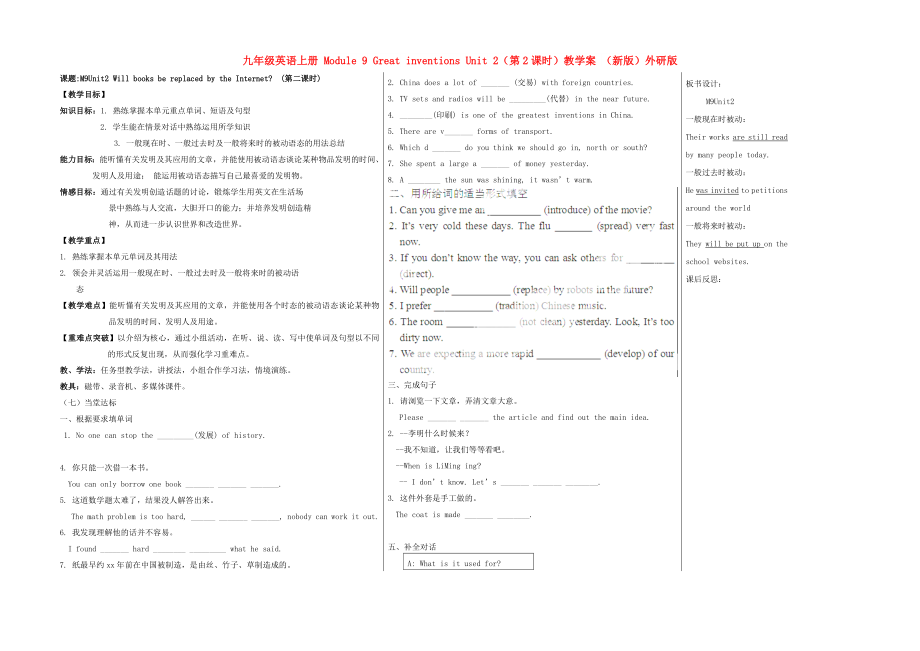《九年級(jí)英語上冊(cè) Module 9 Great inventions Unit 2(第2課時(shí))教學(xué)案 (新版)外研版》由會(huì)員分享����,可在線閱讀,更多相關(guān)《九年級(jí)英語上冊(cè) Module 9 Great inventions Unit 2(第2課時(shí))教學(xué)案 (新版)外研版(2頁珍藏版)》請(qǐng)?jiān)谘b配圖網(wǎng)上搜索�。
1、九年級(jí)英語上冊(cè) Module 9 Great inventions Unit 2(第2課時(shí))教學(xué)案 (新版)外研版
課題:M9Unit2 Will books be replaced by the Internet? (第二課時(shí))
【教學(xué)目標(biāo)】
知識(shí)目標(biāo):1. 熟練掌握本單元重點(diǎn)單詞�����、短語及句型
2. 學(xué)生能在情景對(duì)話中熟練運(yùn)用所學(xué)知識(shí)
3. 一般現(xiàn)在時(shí)���、一般過去時(shí)及一般將來時(shí)的被動(dòng)語態(tài)的用法總結(jié)
能力目標(biāo):能聽懂有關(guān)發(fā)明及其應(yīng)用的文章���,并能使用被動(dòng)語態(tài)談?wù)撃撤N物品發(fā)明的時(shí)間、發(fā)明人及用途�����; 能運(yùn)用被動(dòng)語態(tài)描寫自己最喜愛的發(fā)明物。
情感目標(biāo):通過有關(guān)發(fā)明創(chuàng)造話題的討論�����,鍛煉學(xué)生
2����、用英文在生活場(chǎng)
景中熟練與人交流,大膽開口的能力�����;并培養(yǎng)發(fā)明創(chuàng)造精
神���,從而進(jìn)一步認(rèn)識(shí)世界和改造世界���。
【教學(xué)重點(diǎn)】
1. 熟練掌握本單元單詞及其用法
2. 領(lǐng)會(huì)并靈活運(yùn)用一般現(xiàn)在時(shí)���、一般過去時(shí)及一般將來時(shí)的被動(dòng)語
態(tài)
【教學(xué)難點(diǎn)】能聽懂有關(guān)發(fā)明及其應(yīng)用的文章���,并能使用各個(gè)時(shí)態(tài)的被動(dòng)語態(tài)談?wù)撃撤N物品發(fā)明的時(shí)間、發(fā)明人及用途����。
【重難點(diǎn)突破】以介紹為核心��,通過小組活動(dòng)���,在聽、說���、讀�����、寫中使單詞及句型以不同的形式反復(fù)出現(xiàn)����,從而強(qiáng)化學(xué)習(xí)重難點(diǎn)�����。
教�����、學(xué)法:任務(wù)型教學(xué)法���,講授法�,小組合作學(xué)習(xí)法,情境演練�����。
教具:磁帶�、錄音機(jī)、多媒體課件���。
(七)當(dāng)堂達(dá)標(biāo)
一�����、根據(jù)要求填單詞
3��、 1. No one can stop the _________(發(fā)展) of history.
4. 你只能一次借一本書�����。
You can only borrow one book _______ _______ _______.
5. 這道數(shù)學(xué)題太難了�����,結(jié)果沒人解答出來。
The math problem is too hard, ______ _______ _______, nobody can work it out.
6. 我發(fā)現(xiàn)理解他的話并不容易。
I found _______ hard ________ _________ what he said.
7.
4���、 紙最早約xx年前在中國被制造�����,是由絲���、竹子、草制造成的��。
Paper was first created about 2,000 years ago in China and ______ ______ ______ silk, bamboo and grass.
四�����、單項(xiàng)選擇
1. I hear LiZheng _____ to London next week.
A. sends B. will send C. will be sent D. is going to send
2. _____ the meeting _____ in the meeting centre
5�����、 this afternoon?
A. Does; hold B. Is; held
C. Will; hold D. Will; be held
3. I am sorry the letters ______ tomorrow.
A. have posted B. posted
C. are posting D. aren’t going to be posted
4. These dictionaries ______ the library.
A. will be taken
6�����、out B. won’t be taken out of
C. will take out of D. won’t take out of
5. When _____ the English party ______?
A. is; going to hold B. is; going to be held
C. are; going to hold D are; going to be held.
6. --Your dress feels soft. What’s it made ______?
7�、
--Silk, and it is made ______ China.
A. from; in B. of; in C. from; on D. of; on
7. Before you write down the answers, you should ______ the test paper first to make sure you haven’t missed anything out.
A. look up B. look after C. look for D. look through
2. Chin
8����、a does a lot of _______ (交易) with foreign countries.
3. TV sets and radios will be _________(代替) in the near future.
4. ________(印刷) is one of the greatest inventions in China.
5. There are v_______ forms of transport.
6. Which d _______ do you think we should go in, north or south?
7. She spen
9����、t a large a _______ of money yesterday.
8. A ________ the sun was shining, it wasn’t warm.
三、完成句子
1. 請(qǐng)瀏覽一下文章��,弄清文章大意����。
Please _______ _______ the article and find out the main idea.
2. --李明什么時(shí)候來?
--我不知道����,讓我們等等看吧。
--When is LiMing ing?
-- I don’t know. Let’s _______ _______ ________.
3. 這件外套是手工
10��、做的���。
The coat is made _______ ________.
五�����、補(bǔ)全對(duì)話
A: What is it used for?
B: Is it expensive?
C: Promise!
D: What is it called?
E: Who was it invented by?
A: Hello, Daming. I have something interesting to show you. e and have a look.
B: Wow. 1._________________
A: It’s called “safety lock fo
11���、r door and window”.
B: 2._______________________
A: It’s used for preventing children from falling down the windows of tall buildings.
B: 3._______________________
A: It was invented by two pupils from NO.6 Primary School in Taijiang, Fujian Province.
B: 4.________________________
A: No, it’s
12、cheap. About 28 yuan each.
B: I want to show it to my parents. May I borrow it?
A: Here it is. But bring it back tomorrow.
B: 5.__________________________
板書設(shè)計(jì):
M9Unit2
一般現(xiàn)在時(shí)被動(dòng):
Their works are still read by many people today.
一般過去時(shí)被動(dòng):
He was invited to petitions around the world
一般將來時(shí)被動(dòng):
They will be put up on the school websites.
課后反思:
 九年級(jí)英語上冊(cè) Module 9 Great inventions Unit 2(第2課時(shí))教學(xué)案 (新版)外研版
九年級(jí)英語上冊(cè) Module 9 Great inventions Unit 2(第2課時(shí))教學(xué)案 (新版)外研版

